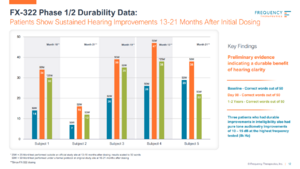It sounds like you haven't been following them very closely at all.
For starters, 10% is the bar for clinically significant improvements; it does not mean that patients are only improving 10%, it's just the number they have to hit to get FDA approval. The wording they use is "subjects achieved 10%
OR GREATER absolute improvement"
Secondly, the 10% scale they use is an absolute measure on a 50 word test so a change of 5 words is 10%. The 10% is not relative to the patients starting score. Many patients have
more than doubled their word scores which is life changing for those people.
Using the Phase 1/2 data for example, patient 1 went from hearing 14 words out of 50 to hearing 30 words out of 50 16 months later. That would be labeled as a 30% absolute improvement when it's actually a 100%+ relative improvement for that patient. That patient was functionally deaf before and was a candidate for cochlear implant surgery (which costs between $30,000 to $50,000.) but now that patient can get by with just a hearing aid. If you can't see the value in a drug that can do something like that, then nothing I can say will persuade you.
Kevin Franck is their Senior Vice President and a licensed audiologist who ran one of the largest audiology clinics in the world at Mass Eye & Ear/Harvard Medical School and he made this statement:
"To me, these early data from small exploratory trials are very encouraging. Each of our responders would have experienced a life-altering improvement and we're beginning to recognize characteristics about them. We've pushed these subjects up on the graph, something no one's been able to do before. As a clinician, I wouldn't hesitate to recommend a drug like this."
You also seem to greatly underestimate the burden of hearing aids and the hassles that come with them. That is like saying why would someone be willing to get Lasik eye surgery if they aren't willing to wear glasses. FREQ has said that only 20% of people that could be using hearing aids are actually using them. I could see a lot of those remaining 80% of people who aren't willing to live with the hassles of hearing aids be willing to get a one time injection that takes less than 15 minutes to do. Using that same Phase 1/2 data, subject 4 improved enough that he/she could likely stop using hearing aids all together if they wanted and could get by with lifestyle modifications.
According to you that shot in the ear does nothing, but I can guarantee you it provided lifechanging results for those that responded in their trials.

 Member
Member
